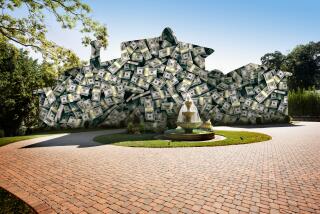Fear of Luxury Tax Reason for No Trades
Pretty lame trading deadline, huh?
Blame it on the lockout and the luxury tax.
One of the reasons why commissioner David Stern shut down the NBA for the first half of last season was to regain some control over runaway spending, which was threatening to cripple the league financially.
When the league finally reached agreement with the players on a six-year collective bargaining agreement, it was backloaded with spending disincentives in the final three years that have had the effect of curtailing trade activity.
Beginning with the 2001-02 season, the highest spending teams might have to pay a dollar-for-dollar luxury tax into a league-controlled fund for the amount that their payrolls exceed a certain number, projected to be $54 million. The money will then be redistributed under a formula that has yet to be determined.
“Teams were very conscious of the luxury tax,” Milwaukee Bucks general manager Ernie Grunfeld said Friday in explaining the dearth of trades. “Teams are planning accordingly, making sure their salary structure is in reasonably good shape for the tax years.”
During the lockout, much was made of the percentage of basketball-related income that would be paid toward player salaries. The sides settled at 55 percent, with penalties if the number is higher.
Since 55 percent is now routinely and easily exceeded, players will have to give back as much as 10 percent of their salaries in 2001-02, 2002-03 and 2003-04, a giveback known as the escrow tax.
The luxury tax is a different deterrent, and will only be applied if spending on player salaries and benefits exceeds 61.1 percent.
In that case, teams spending more than $54 million will have to pay a dollar-for-dollar tax on the excess.
The Portland Trail Blazers, for example, have already committed about $70 million to seven players for the 2001-02 season. That means that Blazers owner Paul Allen, a multibillionaire, will have to pay a luxury tax of at least $16 million.
Some owners do not even want to flirt with the threshold because by keeping their payrolls low, they might qualify for the redistribution payments from the luxury-tax fund.
“Not only are you not paying a tax, you’re getting a check for a substantial amount of money,” Grunfeld explained.
That’s why players like Juwan Howard ($18.7 million in 2001-02) and Shawn Kemp ($25 million in 2003-04) were extra difficult to trade.
One of the teams hamstrung by high salaries is the Washington Wizards. Howard, Rod Strickland and Mitch Richmond are making $35 million this year.
More to Read
Go beyond the scoreboard
Get the latest on L.A.'s teams in the daily Sports Report newsletter.
You may occasionally receive promotional content from the Los Angeles Times.










